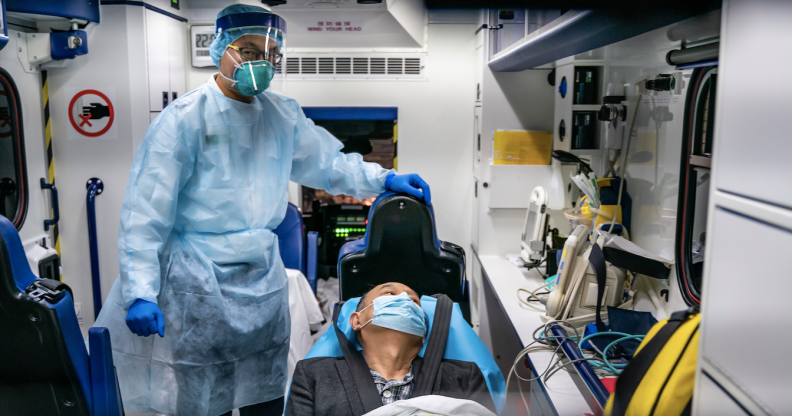Two anti-HIV drugs could be used to cure the Wuhan coronavirus

A coronavirus patient in Hong Kong is transferred by ambulance to the Princess Margaret Hospital (Anthony Kwan/Getty)
As the coronavirus death toll continues to rise, scientists are turning to anti-viral HIV drugs in their search for a cure.
The deadly virus started in Wuhan, China, and has already claimed 170 lives. More than 7,700 people are currently infected in China alone and a further 68 cases have been reported around the world.
While researchers rapidly work on developing a vaccine, the Chinese National Health Commission (NHC) has named a combination of two existing HIV drugs, lopinavir and ritonavir, as part of its treatment plan.
The two medications are sold under the brand name Kaletra by AbbVie and target specific enzymes in the body that both HIV and the coronavirus use to replicate themselves.
According to the medical journal Lancet, the lopinavir-ritonavir combination has had a positive outcome in two similar viruses – the SARS outbreak of 2003 and Middle East respiratory syndrome outbreak of 2012.
It’s not yet clear whether the drugs will have an impact on the new virus, but a clinical trial for a possible cure is currently underway at the Jin Yintan Hospital in Wuhan, where the first coronavirus patients were treated.
With a vaccine still potentially years away, scientists are hopeful the trial could offer a critical breakthrough. Polish epidemiologist Dr Ernest Kuchar called it “the light at the end of the tunnel”.
Professor Jonathan Ball, a virologist at the University of Nottingham, told the BBC: “If there are early signs it might work, it might get used on a compassionate basis – in severe cases – because the drugs haven’t been approved for that use.”
The new pathogen first emerged in December 2019 and was tracked down to Wuhan’s busy seafood and livestock market. It quickly spread beyond China to France, Germany, Japan, the US, Australia, Singapore, Malaysia, Cambodia, Sri Lanka, the UAE, South Korea, Vietnam, Thailand, Canada and Nepal.
The World Health Organisation is holding crisis talks today to determine whether the outbreak constitutes an international emergency.

